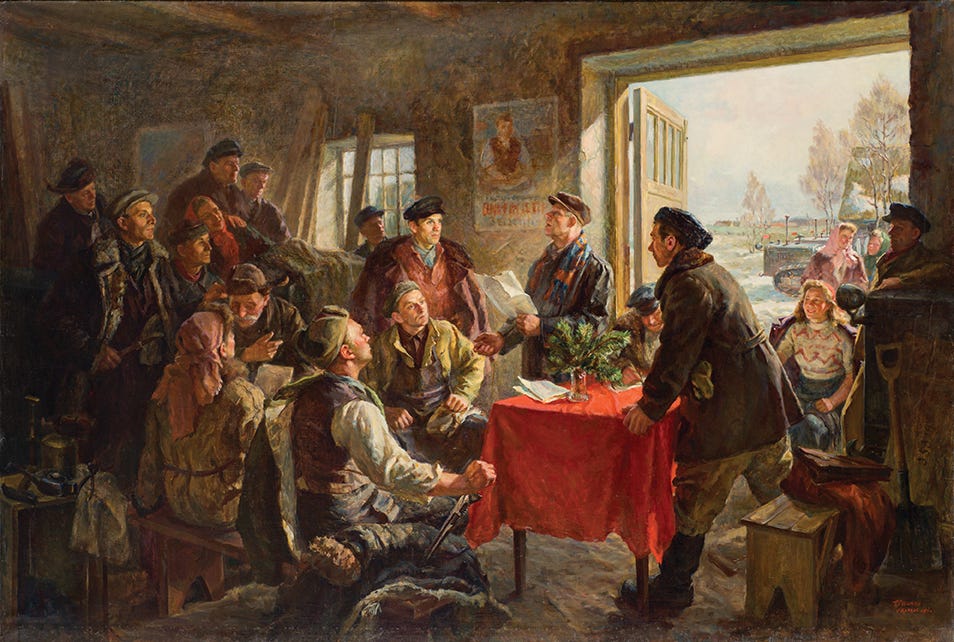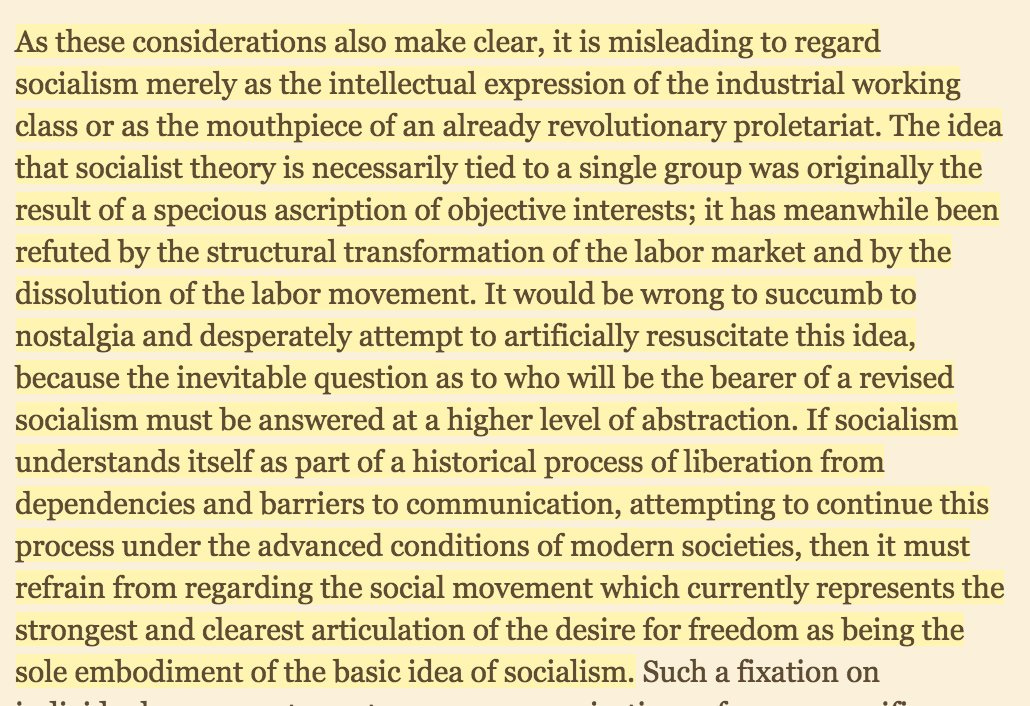Socialist Unrealism
Why You Are Not a Socialist (But Actually Might Be)
One of the arguments that’s you’ll hear in the debates over whether it’s reasonable to call Trump “fascist” is that in the modern United States fascism is not possible because the specific social conditions that fascism requires do not exist. To summarize briefly, today there is not a strong civil society with mass participation in voluntary associations, there are not masses of demobilized military veterans with brutalizing experience of trench warfare, and there is not an industrial economy that has generated a powerful socialist movement that threatens the old social order. In short, fascism is the product of a mass mobilization and dislocation in society, while we have atomization and fragmentation,—not fertile ground. This line of argument is often joked about as the Champagne thesis: “if it’s not from interwar Europe, it’s not fascism, it’s just sparkling authoritarian nationalism.”
A lot of these arguments, particularly when they emphasize civil society, rely on Dylan Riley’s very interesting book The Civic Foundations of Fascism in Europe: Italy, Spain, and Romania, 1870—1945. Not to derail the post entirely, but it feels worth pointing out that Riley’s typology is not quite as strict as either the Trump’s-not-fascism people and other scholars of fascism, who often identify Spain and Romania as more traditional authoritarian states. (Of course, Spain did not have a demobilized corps of veterans from WW1, because it didn’t participate in that conflict. Also, Carol II’s National Renaissance Front didn’t explicitly identify itself as fascist, which we are told is a necessary pre-requisite.)
It would seem nothing today really meets the classical definition of a socialist movement, either. We do not live in the era of the mass industrial proletariat, at least here in the U.S. To their credit, some of the not-fascism people conceded that this was sadly true. I thought this was remarkable because one of the people making this concession is editor at a prominent socialist magazine. (DSA members: if you print this out and show it to them, maybe they will give you your dues back.) I guess this is sort of why I’ve never called myself a socialist either: it just feels something more fit for the 19th and 20th centuries and out of place today. Of course, I feel fine saying I’m a liberal or a social democrat, and those are also both ideologies with their origins in different times.
But this whole conversation made me remember a book I read a few years ago, Axel Honneth’s 2015 The Idea of Socialism: Towards A Renewal. Honneth is the current leading voice of Frankfurt School critical theory and continues that tradition’s revision of Marxism to meet modern social and cultural conditions. For Honneth, all social conflict is a struggle for recognition; groups and individuals in society receive unequal respect and status and emancipatory politics is about gaining recognition as full democratic citizens and, indeed, as full human beings. Economic redistribution flows from this struggle, as he argues entitlement to part of the social product is a consequence of full social recognition. In this project he is following Hegel, who begins his account of human self-consciousness with the life-and-death struggle for recognition that results in the famous Master-Slave dialectic, the first, deficient substitute for full mutual recognition. Honneth’s theory is attractive, because it seems to provide a robust framework to understand the often confusing panoply of social movements in our time.
Honneth does not think “socialism” is an outdated term, he believes the concept can be “renovated” to meet modern conditions. Roughly, we just need to jettison orthodox socialism’s excessive economism and its focus on the historical role of the industrial working class, factors which he thinks anchor socialism to one specific historical epoch. He would get rid of the orthodox emphasis on the communal reorganization of productive capacity in favor of a focus on rights and the political sphere, which are traditionally dismissed by Orthodox Marxists as “bourgeois.” Borrowing from John Dewey’s accounts of experimentation and communication, “Socialism” then becomes the name for all struggles in the political sphere which can articulate the demands of the previously voiceless and free them from social constraints. It should not bog itself down by being the expression of a single social interest, but always be the party of the excluded, the voiceless, and the downtrodden in society.
I certainly find the political vision to be attractive. Whether or not it is really “socialism”, it does describe the political commitment of the Left reasonably well. I think it also decently describes the actual goals and practices of contemporary socialist movements, which take up a number of causes that are not limited to the cause of the traditionally understood industrial worker. I wouldn’t mind being called a socialist in the sense given in his book. And it’s worth pointing out most people who have such commitments in the U.S. are called socialists by their enemies whether they identify as such or not.
The absence of a strong socialist movement is given as one of the reasons given that there can’t be genuine fascism, because fascism is largely a reaction to the rise of socialism. But as I pointed out, in the right wing imagination there is a strong threatening socialism in the United States, it’s just what they call any manifestation of basic, multi-racial democracy. One will notice the “socialism” label is particularly thrown around when the interests of ethnic minorities are the political question. In a way, right wingers are already using something like a Honnethian definition of socialism in their propaganda! This phenomenon makes me remember one of my favorite parts of Karl Marx’s Eighteenth Brumaire, a passage where Marx notes the conservative tendency to label everything “socialist” in periods of crisis:
Even bourgeois liberalism is declared socialistic, bourgeois enlightenment socialistic, bourgeois financial reform socialistic. It was socialistic to build a railway where a canal already existed, and it was socialistic to defend oneself with a cane when one was attacked with a rapier.
This was not merely a figure of speech, fashion, or party tactics. The bourgeoisie had a true insight into the fact that all the weapons it had forged against feudalism turned their points against itself, that all the means of education it had produced rebelled against its own civilization, that all the gods it had created had fallen away from it. It understood that all the so-called bourgeois liberties and organs of progress attacked and menaced its class rule at its social foundation and its political summit simultaneously, and had therefore become "socialistic."
This seemingly hysterical labeling of everything as socialistic represents in fact a recognition that the organs of democratic life constitute real threats to the rule of the dominating class. In this sense, I think all of us on the left are socialists. Certainly the right thinks so, so maybe we should just own it? I am still not joining DSA, though.



BOURGEOIS NONSENSE
I wonder how the concept of "index fund socialism", which seems to mimic parts of the classical definition of socialism (collective ownership of the means of production) without being tied to a particular class interest, fit into this. The various Left proposals to socialize ownership of capitol in some sort of massive sovereign wealth fund seem to both modernize socialism and cling to its (perhaps outdated) commitment to collective ownership of capital rather than simple redistribution.